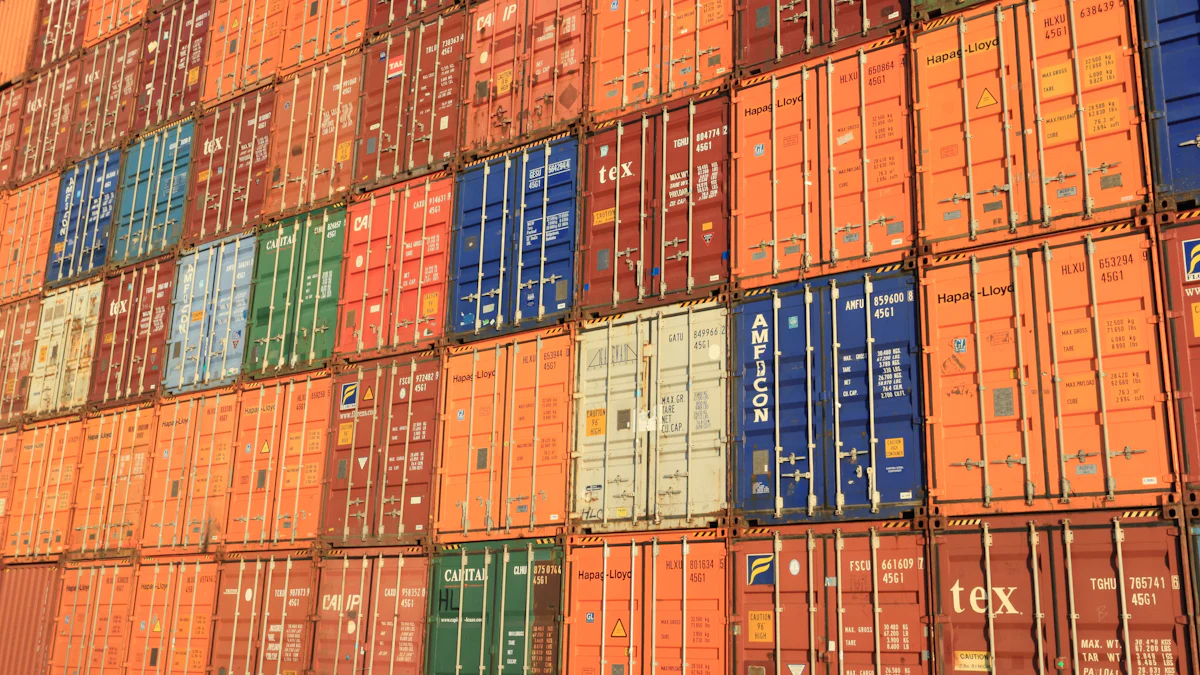Top 13 International Trade Terms: EXW, CIF, FOB

Understanding International Trade Terms is crucial for businesses engaged in global commerce. These terms define the responsibilities of buyers and sellers, ensuring smooth transactions. The complexity and variety of these terms can often lead to confusion. With global trade volume reaching approximately 25 trillion U.S. dollars in 2022, clarity in trade agreements becomes essential. This blog aims to demystify key trade terms, providing clear explanations to help businesses navigate international markets effectively.
Understanding International Trade Terms
Historical Context
Evolution of Trade Terms
Trade has been a cornerstone of human civilization, evolving significantly over centuries. The introduction of currency in the Fertile Crescent marked a pivotal moment, facilitating the exchange of goods and services on a broader scale. As trade networks expanded, particularly among the kingdoms of Africa, the Middle East, India, China, and Southeast Asia, the need for standardized terms became apparent. Despite the instability in Western Europe, these regions maintained robust trade connections.
In 1936, the International Chamber of Commerce introduced Incoterms, a groundbreaking development in international trade. These terms aimed to bridge language gaps and reduce conflicts by providing a common framework for buyers and sellers. This standardization has played a crucial role in simplifying global trade, ensuring that all parties have a clear understanding of their responsibilities.
Importance in Global Trade
International Trade Terms hold immense importance in today's interconnected world. They define the obligations of each party involved in a transaction, minimizing misunderstandings and disputes. By clearly outlining who is responsible for shipping, insurance, and other logistical aspects, these terms facilitate smoother transactions. As global trade continues to grow, the relevance of these terms becomes even more pronounced, ensuring that businesses can operate efficiently across borders.
Basic Concepts
Definition of Trade Terms
International Trade Terms, commonly known as Incoterms, are a set of rules established by the International Chamber of Commerce. They define the responsibilities of sellers and buyers in international transactions. These terms specify who is responsible for various costs and risks associated with the transportation of goods. By providing a clear framework, they help streamline the process of international trade.
Incorporating International Trade Terms into trade agreements is essential for clarity and efficiency. These terms serve as a foundation for contracts, ensuring that both parties understand their roles and responsibilities. By reducing ambiguity, they help prevent disputes and foster trust between trading partners. As a result, businesses can focus on expanding their operations and exploring new markets without the fear of miscommunication.
Incorporating International Trade Terms into trade agreements is essential for clarity and efficiency. These terms serve as a foundation for contracts, ensuring that both parties understand their roles and responsibilities. By reducing ambiguity, they help prevent disputes and foster trust between trading partners. As a result, businesses can focus on expanding their operations and exploring new markets without the fear of miscommunication.
Key Trade Terms Explained

EXW (Ex Works)
Definition and Usage
EXW, or Ex Works, represents one of the simplest International Trade Terms. In this arrangement, the seller fulfills their obligation by making goods available at their premises. The buyer assumes responsibility for all costs and risks associated with transporting the goods from the seller's location to the final destination. This term is often used when the buyer has the capability to manage logistics independently.
Advantages and Disadvantages
Advantages:
Cost-Effective for Sellers: Sellers benefit from minimal responsibility, as they only need to prepare the goods for pickup.
Control for Buyers: Buyers gain complete control over the shipping process, allowing them to choose their preferred logistics providers.
Disadvantages:
Increased Responsibility for Buyers: Buyers must handle all aspects of transportation, including export clearance and insurance.
Potential for Higher Costs: Without careful planning, buyers may incur higher costs due to inefficiencies in logistics management.
CIF (Cost, Insurance, and Freight)
Definition and Usage
CIF, or Cost, Insurance, and Freight, is a widely used International Trade Term. Under CIF, the seller covers the cost of transporting goods to the port of destination, including insurance. The risk transfers to the buyer once the goods are loaded onto the shipping vessel. This term is particularly useful when the seller has established relationships with shipping and insurance providers.
Advantages and Disadvantages
Advantages:
Simplified Logistics for Buyers: Buyers benefit from reduced logistical responsibilities, as the seller manages shipping and insurance.
Predictable Costs: Buyers receive a comprehensive cost that includes freight and insurance, aiding in budgeting.
Disadvantages:
Higher Costs for Sellers: Sellers bear the cost of insurance and freight, which can be substantial.
Limited Control for Buyers: Buyers have less control over the shipping process and may face challenges if issues arise during transit.
FOB (Free On Board)
Definition and Usage
FOB, or Free On Board, is another essential International Trade Term. In an FOB arrangement, the seller is responsible for delivering goods to the port of shipment and loading them onto the vessel. The buyer assumes responsibility for the goods once they are on board. This term is commonly used in maritime trade, providing a clear division of responsibilities.
Advantages and Disadvantages
Advantages:
Balanced Responsibilities: Both parties share responsibilities, with the seller handling initial logistics and the buyer managing the journey from the port of origin.
Cost Efficiency: FOB often offers a middle ground in terms of cost, balancing expenses between the seller and buyer.
Disadvantages:
Risk Transfer at Loading: The buyer assumes risk once the goods are loaded, which can be a disadvantage if issues occur during transit.
Potential for Misunderstandings: Clear communication is essential to avoid disputes over responsibilities and costs.
Additional Important Trade Terms
FCA (Free Carrier)
Definition and Usage
FCA (Free Carrier) is a versatile International Trade Term that obligates the seller to deliver goods to a specified location within the seller's country. This location could be the seller's premises, a terminal, or any other agreed-upon place. The seller must ensure the goods are ready for transportation, handling export clearance and loading. Once the goods reach the designated location, the risk of loss transfers to the buyer. The buyer then assumes responsibility for all subsequent costs and arrangements.
Advantages and Disadvantages
Advantages:
Flexibility: FCA offers flexibility in choosing the delivery location, accommodating various logistical needs.
Clear Risk Transfer: The transfer of risk occurs at a clearly defined point, reducing potential disputes.
Disadvantages:
Buyer Responsibility: Buyers must manage transportation from the delivery point, which may require additional coordination.
Potential for Higher Costs: Buyers might incur higher costs if they lack efficient logistics management.
DDP (Delivered Duty Paid)
Definition and Usage
DDP (Delivered Duty Paid) represents a comprehensive International Trade Term where the seller assumes all responsibilities, risks, and costs until the goods reach the buyer's designated location. This includes import duties and taxes. The seller manages every aspect of the transaction, ensuring the buyer receives the goods without additional logistical concerns.
Advantages and Disadvantages
Advantages:
Convenience for Buyers: Buyers benefit from minimal involvement in logistics, as the seller handles all aspects of delivery.
Predictable Costs: Buyers receive a final cost that includes all duties and taxes, aiding in financial planning.
Disadvantages:
High Responsibility for Sellers: Sellers bear significant responsibility and risk, which can be challenging if unforeseen issues arise.
Potential for Delays: Delays in customs clearance or other processes can impact delivery timelines.
CPT (Carriage Paid To)
Definition and Usage
CPT (Carriage Paid To) tasks the seller with arranging and delivering goods to the first means of transport or a named place of delivery. The seller covers the transportation costs until the goods reach this point. Once the goods are loaded, the risk transfers to the buyer. This term minimizes risk for the seller while providing a clear framework for cost allocation.
Advantages and Disadvantages
Advantages:
Cost Management for Sellers: Sellers manage transportation costs up to the delivery point, allowing for better budgeting.
Risk Clarity: The transfer of risk at a specific point reduces ambiguity in responsibilities.
Disadvantages:
Limited Control for Buyers: Buyers have less control over the initial stages of transportation, which may lead to challenges if issues occur.
Potential for Misunderstandings: Clear communication is essential to avoid disputes over responsibilities and costs.
CIP (Carriage and Insurance Paid To)
CIP (Carriage and Insurance Paid To) represents a significant International Trade Term that obligates the seller to cover transportation and insurance costs up to a specified destination. The seller arranges for the carriage of goods and provides insurance coverage, ensuring the buyer receives compensation if the goods suffer damage or loss during transit. Once the goods are handed over to the carrier, the risk transfers to the buyer. This term is particularly beneficial in multimodal transport scenarios, where goods may travel via multiple modes of transportation.
Definition and Usage
In a CIP arrangement, the seller assumes responsibility for delivering goods to a designated location, covering both transportation and insurance costs. The seller must ensure that the insurance coverage meets the minimum requirements, providing protection against potential risks during transit. The buyer benefits from reduced logistical responsibilities, as the seller manages the initial stages of transportation and insurance arrangements. This term is widely used when the seller has established relationships with carriers and insurance providers, facilitating smoother transactions.
Advantages and Disadvantages
Advantages:
Comprehensive Coverage: The seller provides insurance, offering protection against potential losses during transit.
Reduced Buyer Responsibility: Buyers benefit from minimized logistical involvement, as the seller handles transportation and insurance.
Predictable Costs: Buyers receive a clear cost structure, aiding in financial planning and budgeting.
Disadvantages:
Limited Control for Buyers: Buyers have less influence over the choice of carrier and insurance provider, which may lead to challenges if issues arise.
Higher Costs for Sellers: Sellers bear the cost of insurance and transportation, which can be substantial depending on the destination and mode of transport.
DDU (Delivered Duty Unpaid)
DDU (Delivered Duty Unpaid) is another crucial International Trade Term where the seller delivers goods to a specified location without paying import duties or taxes. The buyer assumes responsibility for these costs upon arrival. This term provides flexibility in international transactions, allowing buyers to manage customs clearance and related expenses according to their preferences.
Definition and Usage
Under DDU, the seller takes charge of transporting goods to the buyer's designated location, excluding import duties and taxes. The buyer must handle customs clearance and pay any applicable duties and taxes upon arrival. This term is advantageous when the buyer has expertise in managing customs procedures and prefers to control the import process. DDU offers a clear division of responsibilities, ensuring both parties understand their roles in the transaction.
Advantages and Disadvantages
Advantages:
Flexibility for Buyers: Buyers can manage customs clearance and related expenses, tailoring the process to their needs.
Clear Responsibility Division: The term provides a distinct separation of duties, reducing potential disputes over costs and responsibilities.
Disadvantages:
Increased Buyer Responsibility: Buyers must handle customs clearance and pay import duties, which may require additional coordination and expertise.
Potential for Delays: Delays in customs clearance or other processes can impact delivery timelines, affecting the buyer's operations.
Practical Implications of Trade Terms

Impact on Shipping and Logistics
Cost Considerations
International Trade Terms significantly influence shipping and logistics costs. Each term delineates specific responsibilities for sellers and buyers, impacting the overall cost structure. For instance, under CIP (Carriage and Insurance Paid To), the seller covers transportation and insurance costs up to a named place. This arrangement allows buyers to predict expenses more accurately, as they only assume risk once goods are handed over to the carrier. Conversely, terms like DDP (Delivered Duty Paid) place the highest financial burden on sellers, who must cover all costs, including transport, insurance, and import duties. Businesses must carefully evaluate these terms to optimize their logistics budgets and ensure cost-effective operations.
Risk Management
On the other hand, DDP requires sellers to navigate customs and bear all risks until goods arrive at the buyer's location. Understanding these nuances helps businesses develop robust risk management strategies, safeguarding their interests in global transactions.
Legal and Contractual Aspects
Importance in Contracts
Incorporating International Trade Terms into contracts is essential for clarity and legal precision. These terms establish a common language, ensuring both parties understand their obligations. By specifying responsibilities for shipping, insurance, and customs clearance, trade terms reduce ambiguity and prevent disputes. For example, CIP clearly outlines the seller's duty to provide insurance, while DDP mandates the seller to handle all import-related tasks. Such clarity fosters trust between trading partners and streamlines contract negotiations, allowing businesses to focus on expanding their market reach.
Common Legal Challenges
Despite their benefits, International Trade Terms can present legal challenges. Misinterpretations or omissions in contracts may lead to disputes over responsibilities and costs. For instance, confusion over the risk transfer point in CIP could result in disagreements if goods are damaged during transit. Similarly, delays in customs clearance under DDP might cause contractual breaches. To mitigate these risks, businesses should seek legal expertise when drafting contracts, ensuring that all terms are accurately represented. By addressing potential legal pitfalls, companies can maintain smooth operations and protect their interests in international trade.
Common Challenges and Misunderstandings
Misinterpretation of Terms
Misinterpretation of International Trade Terms often leads to disputes and financial losses. Many businesses make common mistakes, such as assuming responsibilities without clear understanding or failing to specify terms in contracts. These errors can result in unexpected costs and delays.
Common Mistakes
Assuming Responsibilities: Businesses sometimes assume responsibilities not explicitly stated in the contract. This can lead to unexpected costs and liabilities.
Inadequate Documentation: Failing to document trade terms accurately can cause confusion and disputes. Proper documentation ensures clarity and accountability.
Overlooking Updates: Ignoring updates to International Trade Terms can result in non-compliance with current standards, leading to legal challenges.
How to Avoid Misunderstandings
Consult Experts: Engaging with international trade law specialists can help tailor contracts to specific needs and ensure compliance with laws and regulations. This minimizes the risk of misinterpretation.
Clear Documentation: Clearly documenting all trade terms in contracts helps avoid ambiguity. This practice promotes transparency and reduces the likelihood of disputes.
Regular Training: Providing regular training for staff on the latest International Trade Terms ensures that everyone involved understands their roles and responsibilities.
Adapting to Changes in Trade Policies
Adapting to changes in trade policies is crucial for maintaining smooth operations. Recent updates to International Trade Terms require businesses to stay informed and agile.
Recent Changes in Trade Terms
The International Chamber of Commerce periodically updates International Trade Terms to reflect changes in global trade practices. These updates aim to simplify and streamline complex processes, ensuring clarity and consistency in international transactions.
"Standardizing trade terms promotes clarity and transparency in international trade."
Strategies for Adaptation
Stay Informed: Regularly review updates from the International Chamber of Commerce to stay informed about changes in International Trade Terms.
Implement Changes: Quickly implement changes in trade policies to ensure compliance and avoid potential legal issues.
Leverage Technology: Utilize technology to track and manage trade terms efficiently. This can boost operating income by improving trade terms efficiency and effectiveness.
By understanding and addressing these common challenges, businesses can minimize disputes and protect their cash flow. Clear and concise International Trade Terms play a vital role in reducing misunderstandings and ensuring smoother export and import processes.
Understanding international trade terms remains crucial for businesses navigating global markets. These terms define responsibilities, ensuring smooth transactions and minimizing disputes. Companies should apply this knowledge practically, optimizing logistics and cost management. Staying informed about updates in trade terms is essential, as changes can impact operations significantly.
"Trade policy challenges, such as changes in U.S. trade agreements, influence technology regulations and workers' rights."
By keeping abreast of these developments, businesses can adapt strategies effectively, maintaining competitiveness in an ever-evolving trade landscape.
See Also
Discovering Triumph in International Trade with JUSDA
Revolutionary Approaches: Vendor Partnerships in Global E-commerce Exposed
The Definitive Handbook on Worldwide Shipping Firms Uncovered
Ocean Cargo Transport Exposed: Latest Trends in 2024?
Revealing the Influence of Worldwide Trade Regulations on Economies
